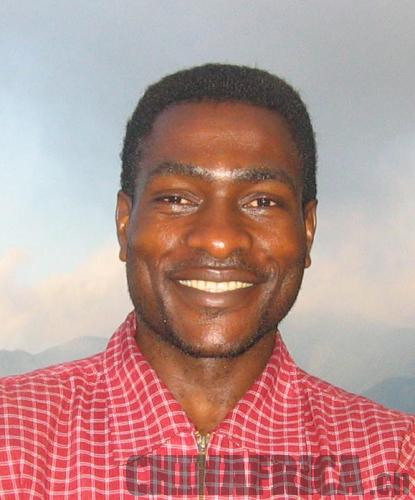|
 |
|
COURTESY of Akonga Jonas Theodore |
Artist Akonga Jonas Theodore, who is from the Democratic Republic of Congo, came to China on a government scholarship in 2003. While studying at the Central Academy of Fine Arts (CAFA) in Beijing, he won the "Art on Peace Ambassador" award at the Fourth International Art Exhibition on Peace held in the Chinese capital. Recently, he spoke to ChinAfrica about his depiction of peace using a unique Chinese symbol: the Great Wall.
What prompted you to come to China?
Before coming to China, I taught at the Art Institute of Kinshasa. After three years of teaching, I got a scholarship to study at CAFA in 2003. In 2004, after one year of studying Chinese language at Beijing Language and Culture University, I started at CAFA, [studying] advanced training with a special curriculum. In 2005, instead of going back home, CAFA granted to me another scholarship for a master's degree [in fine arts]. Now I am doing research on contemporary art and culture. I have a total of nine years in China with two to go, [since] I will complete my doctoral degree in 2014.
How would you describe your painting style?
On all my canvases I only use oil paints without any mixed media. My style is half realistic-half abstract, with a taste of surrealism. I like what is mysterious.
You won the "Art on Peace Ambassador" awards at the Fourth International Art Exhibition on Peace. What does peace mean to you?
My country was embroiled in war for a period of time. But now things are going on well. The rest of the world must consider my country [the DRC] as one at peace, not war. I knew the war, I lived during the war and I saw people dying and others mourning. There were families that disappeared. Villages disappeared, houses destroyed and burnt. People suffered, even those who were not directly touched. From thousands of kilometers away, you lived in the fear that tomorrow does not belong to you. It's not a secure place anymore preventing people from visiting – this is the Western eye.
|

|
|
Artist Akonga Jonas Theodore won the "Art on Peace Ambassador" award at the Fourth International Art Exhibition on Peace held in the Chinese capital (PHOTO BY LIU JIAN) |
How do you demonstrate peace in your art? Why did you choose the Great Wall as a symbol of peace?
My paintings encourage people to cultivate the love of peace. First, we need to understand who we are and who we want to be. Through this understanding we can connect every country in the world to each other with a sustained expression of love.
The Great Wall as a symbol of peace is an artistic reading of a fact. The main reason the Great Wall was built was to [protect] China from outside attacks and to keep lives, land, and even air safe inside the wall. It brings peace inside the land, save lives. In my painting, it signifies preserving my own culture from the invasion of other so-called great cultures. I don't mean there should not be cultural exchange, but what I have to get from another culture should not destroy my own culture. People without culture and history have no future. Wars are raining in Africa simply because we destroyed our own culture and are willing to be Western although we knowingly borrow destruction.
What inspiration have you drawn from your stay in China?
In China, I opened my mind to gigantesque. I really like looking at the horizontal line of the earth embracing the wideness. This is what I do most of the time. I just look at that line.
Is traveling important to you as an artist? Why?
I like traveling. As an artist, I think traveling [provides] a way through other cultures. Traveling is [like] a big book where we can be both writer and reader at the same time. For artists, we call it an "excursion," for those students who go to distant places to pursue their artistic work. |